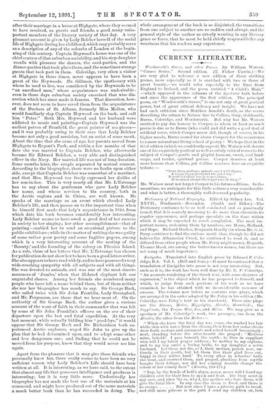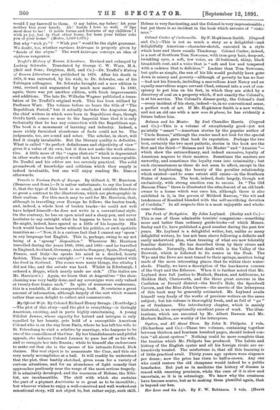Euripides. Translated into English prose by Edward P. Cole- ridge,
B.A. Vol. I. (Bell and Sons.)—It must be confessed that a translation of Euripides into prose is not very interesting. But, such as it is, the work has been well done by Mr. E. P. Coleridge. " An accurate rendering of the Greek text, with seine elegance of expression," is the object which he has proposed to himself, and which, to judge from such portions of his work as we have examined, he has attained with no inconsiderable pleasure of success. The volume now before us contains nine plays, which are arranged in the order adopted by Mr. Paley in his edition (Mr. Coleridge uses Paley's text as his standard). These nine plays are the Rhesus, Medea, Hippolytus, Alcestis, Heracleidw, the Suppliants, the Trojan War, Ion, and Helen. Wo may give as a specimen of Mr. Coleridge's work, two passages, one from the Alcestis, the other from the Medea :— " When she know the fatal day was come, she washed her fair white skin with water from the stream, then from her cedar chests drew forth vesture and ornaments and robed herself becomingly ; next, standing before the altar-hearth she prayed : ' Mistress mine, behold ! I pass beneath the earth ; to thee in suppliant wise will I my latest prayer address ; be mother to my orphans, and to my boy unite a loving bride, to my daughter a noble husband. Let them not die, as I, their mother, perish now, un- timely in their youth, but let them live their glad lives out, happy in their native land.' To every altar in Admetus' halls she went, and crowned them, and prayed, plucking from myrtle boughs their foliage, nor did her coming trouble change the colour of her comely face." (Alcestis, 158-174.) "Nay, by the fiends of hell's abyss, never, never will I hand my children over for their foes to mock and flout. Die they must in any case, and since 'tis so, why I, the mother who bore them, will give the fatal blow. In any case the doom is fixed, and there is
no escape But now since I have a piteous path to tread, and still more piteous is the path I send my children on, fain
would I say farewell to them. 0 my babes, my babes ! let your mother kiss your hands. Ah ! hands I love so well. 0 lips most dear to me ! 0 noble forms and features of my children ! I wish ye joy, but in that other home, for here your father robs you of your home." (Medea, 1,050-1,073.) But why "wish ye"? " Wish you" would be the right grammar. We doubt, too, whether yEirr‘pous 10u:fel-vas is properly given by "fiends of the abyss." The word akicrrupss conveys an idea of righteous vengeance.



































 Previous page
Previous page